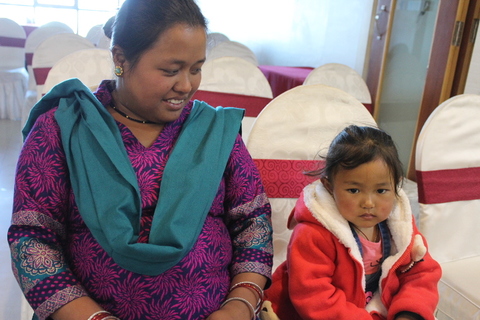Water is one of our most precious and indispensable commodities. Smartphones4Water (S4W)-Nepal generates the data necessary to support both water users and policymakers in making wise water management decisions. In the Kathmandu valley of Nepal, extreme population growth has led to stress on water resources; the project initiated by S4W-Nepal has the objective of collecting the data necessary to quantify these stresses so that effective solutions can be identified, developed and implemented. S4W-Nepal leverages “citizen scientists” for the measurement of different components of water (precipitation, evaporation, water level, etc.) through use of an Android smartphone application called Open Data Kit (ODK) Collect. For the measurement of precipitation and evaporation, S4W-Nepal provides a local rain gauge to the citizen scientists. This approach is rapidly scalable and cost effective in a developing country like Nepal.
We have 60+ citizen scientists taking daily precipitation measurements in different parts of the Kathmandu Valley, covering the Valley spatially. Included below is an interview with Yurisha Duwal, one of our citizen scientists taking daily precipitation and evaporation measurements. Each citizen scientist has their own story and unique perspective to share. Keep reading to learn about her experiences working as a citizen scientist with S4W-Nepal, some of her personal interests, and some of her other thoughts.
Yurisha Duwal is a bachelor’s student studying to become a pharmacist at Little Angels College of Health Science. Since she is in her final year, her daily activities are very concentrated on academics, however, she has a keen interest in and really enjoys dancing and singing. Besides that, she loves travelling to new places and has so far explored the central and eastern parts of Nepal (Janakpur, Sauraha and Chitwan) and Darjeeling and Sikkim of India. She got involved in S4W-Nepal through one of her friends and learned more about our work through our website and social media (Facebook and Instagram).
In her interview, Duwal said ‘Data is an important aspect for management of any resource! Here, in this case, it’s water!’. She believes the water-related data collected by S4W-Nepal and citizen scientists will ultimately help in sustainable water resource management in the near future. She further added, ‘I had no idea about the citizen science concept. I thought citizen scientists should come from a scientific background with good academics at first. However, being a part of S4W-Nepal, I came to understand this modern concept of citizen science and became fascinated by it.’ Being a medical student, she was not related to the water resources field academically, however, as a responsible citizen, she believes it’s her duty to be aware and take care of the environment she lives in. She added, ‘I will always be happy to contribute to the environment from my side, whether that be a small contribution like data collection or any other contribution. This is one of the key factors that drove me to become a part of S4W-Nepal’. She further encouraged her friends to become citizen scientists and become aware of the importance of data collection. Additionally, Duwal is one of only a few citizen scientists taking evaporation measurements, which we think is fantastic and really appreciate.
She believes that to accomplish or achieve any goal (in this case, sustainable water resource management), huge actions are not mandatory; small actions by many can help achieve and contribute to a better change. A lot of little things added together can turn out to be a pretty big thing. Adding this idea to the message she shares with others, she tells her fellow citizen scientists and friends that even a single measurement and data point can make a huge difference and can bring a significant change in the field of research and implementation of more sustainable management strategies. She further encourages everyone to continually collect and send data.
Nepal is a developing country where expensive technologies and environmental monitoring equipment and methods are not affordable. In such an instance, Duwal appreciates the cost-effective initiative taken by S4W-Nepal in mobilizing citizen scientists, mobile technologies and young researchers in data collection. However, she also suggests that measures to enhance the data collection techniques looking forward into the implementation of sustainable management strategies will be an interesting project and thing to think of. Since thus far, S4W-Nepal has mostly focused on the Kathmandu Valley, she added that this interesting and fascinating concept should be introduced all over the rest of Nepal too.
Each day, Yurisha Duwal uses an Android application called Open Data Kit (ODK) collect to record rainfall and evaporation. These measurements are recorded using a locally made inexpensive gauge (each gauge costs about $1.50 USD, learn how to make your own here). Each gauge is provided to citizen scientists by S4W-Nepal for free.
S4W = young researchers + citizen scientists + mobile technology. Citizen science refers to collaborations between scientists and general people to fill important scientific data gaps and expand the horizon of scientific data collection. S4W-Nepal uses an Android application called Open Data Kit (ODK) for data collection with the help of citizen scientists. The advanced mobile technology with good GPS and camera have improved the reliability and accuracy of citizen science observations. The citizen science approach is cost effective and rapidly scalable.


